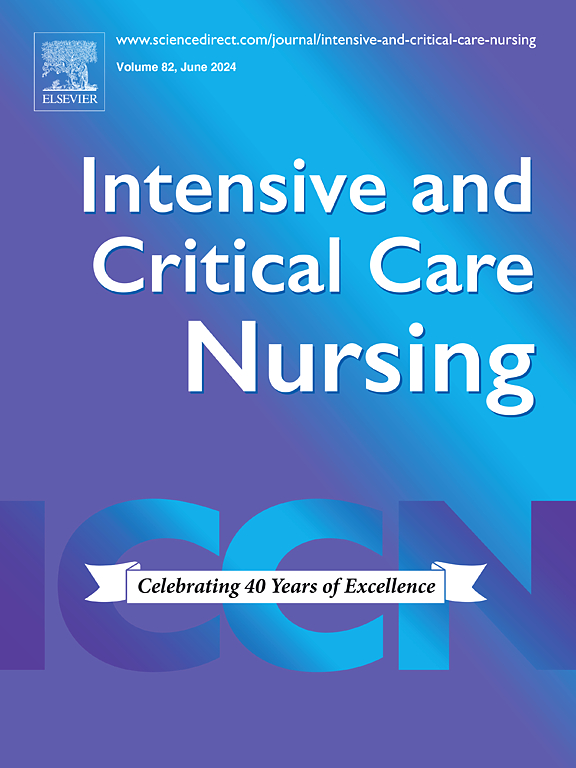Wab-WPPEP 对心脏瓣膜置换术患者家庭护理人员重症监护后综合征的影响:随机对照试验
IF 4.9
2区 医学
Q1 NURSING
引用次数: 0
摘要
目的评估基于微信小程序的全过程心理赋权项目(Wab-WPPEP)对心脏瓣膜置换术后患者家庭护理人员重症监护后综合征-家庭的影响:双臂、平行、随机对照临床试验:方法:将参与者随机分为两组:方法:参与者被随机分配到两组。干预组接受 Wab-WPPEP,对照组接受常规护理。干预措施从重症监护室入院到出院后一个月内实施。主要结果是焦虑,次要结果包括抑郁、创伤后应激障碍(PTSD)和生活质量。采用标准化问卷对基线(T0)、转入 ICU 前(T1)、出院前(T2)和出院后一个月(T3)的结果进行评估。采用广义估计方程分析重复测量数据:结果:干预组在焦虑方面有更大的改善(T1:β =-1.92,95 % CI:-2.35 至-1.49,P 结论:Wab-WPPEP 显著降低了患者的焦虑:Wab-WPPEP能明显减轻心脏瓣膜置换术患者家属照顾者的焦虑和抑郁,提高生活质量,减轻创伤后应激障碍症状:临床实践的启示:应在重症监护室住院和康复期间实施全面的心理干预措施,以改善家庭护理人员的福祉。本文章由计算机程序翻译,如有差异,请以英文原文为准。
Effects of Wab-WPPEP on post-intensive care syndrome-family in family caregivers of heart valve replacement patients: A randomized controlled trial
Objectives
To evaluate the effects of a WeChat applet-based whole process psychological empowerment program (Wab-WPPEP) on post-intensive care syndrome-family in family caregivers of heart valve replacement patients.
Design
Two-arm, parallel, randomized controlled clinical trial.
Settings
A tertiary general hospital in Fuzhou, China.
Methods
Participants were randomly assigned to two groups. The intervention group received Wab-WPPEP, while the control group received routine care. The intervention was implemented from ICU admission to one month post-discharge. The primary outcome was anxiety, while secondary outcomes included depression, post-traumatic stress disorder (PTSD), and quality of life. Outcomes were assessed at baseline (T0), before ICU transfer (T1), pre-discharge (T2), and one month post-discharge (T3) using standardized questionnaires. Generalized estimating equations were used to analyze the repeated-measures data.
Results
The intervention group exhibited greater improvements in anxiety (T1: β = −1.92, 95 % CI: −2.35 to −1.49, P < 0.001; T2: β = −1.66, 95 % CI: −2.03 to −1.29, P < 0.001; T3: β = −3.98, 95 % CI: −4.34 to −3.62, P < 0.001), depression (T1: β = −1.32, 95 % CI: −1.79 to −0.85, P < 0.001; T2: β = −1.70, 95 % CI: −2.08 to −1.32, P < 0.001), and quality of life (T2: β = 31.16, 95 % CI: 21.35 to 40.98, P < 0.001) compared to the routine-care group. PTSD scores were also significantly lower in the intervention group (t = −6.454, P < 0.001).
Conclusions
Wab-WPPEP significantly reduced anxiety and depression, improved quality of life, and alleviated PTSD symptoms in family caregivers of heart valve replacement patients.
Implications for clinical practice
Comprehensive psychological interventions should be implemented throughout the ICU stay and recovery period to improve family caregiver well-being.
求助全文
通过发布文献求助,成功后即可免费获取论文全文。
去求助
来源期刊

Intensive and Critical Care Nursing
NURSING-
CiteScore
6.30
自引率
15.10%
发文量
144
审稿时长
57 days
期刊介绍:
The aims of Intensive and Critical Care Nursing are to promote excellence of care of critically ill patients by specialist nurses and their professional colleagues; to provide an international and interdisciplinary forum for the publication, dissemination and exchange of research findings, experience and ideas; to develop and enhance the knowledge, skills, attitudes and creative thinking essential to good critical care nursing practice. The journal publishes reviews, updates and feature articles in addition to original papers and significant preliminary communications. Articles may deal with any part of practice including relevant clinical, research, educational, psychological and technological aspects.
 求助内容:
求助内容: 应助结果提醒方式:
应助结果提醒方式:


